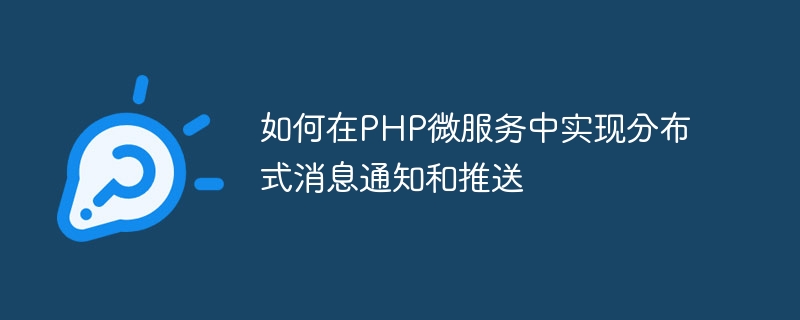Home >Backend Development >PHP Tutorial >How to implement distributed message notification and push in PHP microservices
How to implement distributed message notification and push in PHP microservices
- WBOYWBOYWBOYWBOYWBOYWBOYWBOYWBOYWBOYWBOYWBOYWBOYWBOriginal
- 2023-09-25 16:15:441755browse

The following is an implementation method of distributed message notification and push based on PHP microservices, including detailed code examples.
Title: Distributed message notification and push implementation in PHP microservices
Introduction:
With the rise of microservice architecture, more and more applications adopt distributed Architecture to achieve system splitting and service decoupling. In distributed systems, message notification and push are very common requirements for asynchronous communication between different services. For PHP microservices, how to implement distributed message notification and push is an important and challenging task. This article will introduce a method to implement distributed message notification and push in PHP microservices, and provide corresponding code examples.
1. Using message queue
- Installing and configuring message queue
In PHP microservices, we can use some popular message queue systems, such as RabbitMQ, Kafka, etc. First, the corresponding message queue system needs to be installed and configured on the server. Taking RabbitMQ as an example, you can install it through the following command:
# 安装依赖 sudo apt-get install -y curl gnupg debian-archive-keyring apt-transport-https # 添加RabbitMQ官方GPG key curl https://packages.rabbitmq.com/rabbitmq-release-signing-key.asc | sudo apt-key add - # 添加RabbitMQ的APT源 echo "deb https://dl.bintray.com/rabbitmq/debian $(lsb_release -cs) main" | sudo tee /etc/apt/sources.list.d/bintray.rabbitmq.list # 更新APT源 sudo apt-get update # 安装RabbitMQ Server sudo apt-get install -y rabbitmq-server
- Create queues and switches
After the installation is complete, you can create queues and switches through the RabbitMQ management interface or command line tools . For example, you can create a queue named "notification" and an exchange named "exchange" using the following commands:
# 创建队列 sudo rabbitmqctl add_queue notification # 创建交换机 sudo rabbitmqctl add_exchange exchange
- Sending and receiving messages
In PHP code, Messages can be sent and received using RabbitMQ's client library. First, you need to install the corresponding RabbitMQ client library. It can be installed through Composer:
composer require php-amqplib/php-amqplib
Next, you can use the following code example to send a message:
<?php
require_once __DIR__ . '/vendor/autoload.php';
$connection = new PhpAmqpLibConnectionAMQPStreamConnection('localhost', 5672, 'guest', 'guest');
$channel = $connection->channel();
$channel->exchange_declare('exchange', 'direct', false, false, false);
$message = 'Hello, world!';
$channel->basic_publish(new PhpAmqpLibMessageAMQPMessage($message), 'exchange', 'notification');
$channel->close();
$connection->close();Here is the example code to receive a message:
<?php
require_once __DIR__ . '/vendor/autoload.php';
$connection = new PhpAmqpLibConnectionAMQPStreamConnection('localhost', 5672, 'guest', 'guest');
$channel = $connection->channel();
$channel->exchange_declare('exchange', 'direct', false, false, false);
list($queue_name, ,) = $channel->queue_declare('', false, false, true, false);
$channel->queue_bind($queue_name, 'exchange', 'notification');
$callback = function ($msg) {
echo 'Received message: ' . $msg->body;
};
$channel->basic_consume($queue_name, '', false, true, false, false, $callback);
while ($channel->is_consuming()) {
$channel->wait();
}
$channel->close();
$connection->close(); 2. Use push services
In addition to using message queues, we can also use some specialized push services to implement distributed message notification and push. The following is an example using cloud push service (taking Alibaba Cloud Push as an example):
- Register and configure push service
First, you need to register and create a push service on Alibaba Cloud. After successful registration, you can obtain some necessary identity authentication information, such as Access Key and Access Secret. Next, configure this information into the PHP microservice to facilitate subsequent push operations. - Install Push SDK
In order to facilitate the operation of push services, we can use Alibaba Cloud Push SDK. Use Composer to install the SDK:
composer require alibabacloud/sdk
- Send push messages
You can send push messages through the following code example:
<?php
require_once __DIR__ . '/vendor/autoload.php';
use AlibabaCloudClientAlibabaCloud;
use AlibabaCloudClientExceptionClientException;
use AlibabaCloudClientExceptionServerException;
use AlibabaCloudClientResultResult;
AlibabaCloud::accessKeyClient('<your_access_key>', '<your_access_secret>')
->regionId('cn-hangzhou')
->asDefaultClient();
try {
$result = AlibabaCloud::rpc()
->product('Push')
->version('2016-08-01')
->action('Push')
->method('POST')
->host('push.aliyuncs.com')
->options([
'query' => [
'RegionId' => 'cn-hangzhou',
'Target' => 'all',
'TargetValue' => 'all',
'Title' => 'Hello, world!',
'Body' => 'This is a push message.',
],
])
->request();
// 处理返回结果
if ($result instanceof Result) {
if ($result->isSuccess()) {
// 成功处理
echo 'Push message sent successfully';
} else {
// 失败处理
echo 'Failed to send push message: ' . $result->getErrorMessage();
}
} else {
// 请求异常处理
echo 'Failed to send push message.';
}
} catch (ClientException $e) {
// 客户端异常处理
echo 'Failed to send push message: ' . $e->getMessage();
} catch (ServerException $e) {
// 服务器异常处理
echo 'Failed to send push message: ' . $e->getMessage();
}Summary:
Passed Using message queues and push services, we can implement distributed message notification and push functions in PHP microservices. Whether you use message queue or push service, you need to install, configure and call the corresponding API accordingly. Being familiar with these basic concepts and operating methods can help us better implement message notification and push functions in distributed systems and improve application reliability and performance. Of course, based on actual needs, we can also choose other suitable solutions to implement distributed message notification and push.
The above is the detailed content of How to implement distributed message notification and push in PHP microservices. For more information, please follow other related articles on the PHP Chinese website!
Related articles
See more- PHP: Push messages using Aurora
- The principles and basic knowledge of WebSocket to implement Java background message push
- How to push messages to APP in laravel
- How to use PHP microservices to implement distributed transaction management and processing
- How to implement distributed containers and virtualization using PHP microservices

